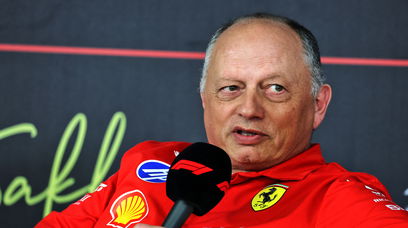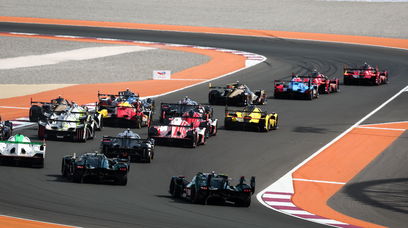Naomi Osaka's withdrawal from the French Open has led to some head scratching over how to progress with never-ending sporting media obligations in a world that is slowly becoming more aware and tolerant of mental health issues. Citing her mental health and a battle with depression, Osaka withdrew from Roland Garros after being threatened with more severe sanctions by tournament organisers after missing a press conference over the weekend. Having been fined $15,000 for the transgression, Osaka opted against continuing with the tournament rather than back down, and has set off a major talking point about the implications for different sports and how the media treats their athletes. In Formula 1's case, media obligations are written into the Sporting Regulations, forcing drivers to meet with journalists and broadcasters at different points throughout the weekend. On top of these obligations, many teams and companies will also host their own media opportunities to ensure more visibility, more headlines, and more opportunities to keep their sponsors happy. But what happens when a driver is facing an onslaught of questioning that they cannot escape? A recent example is that of Alex Albon at Red Bull, who lost his seat at the end of 2020 after a year spent defending himself to everybody about why he shouldn't be replaced. On top of the pressures facing him on-track, Albon had to put with that kind of scrutiny almost all of the time out of the car and, perhaps understandably, spiralled downwards. His Red Bull predecessor, Pierre Gasly, is another example. The French driver had a torrid time throughout most of 2019, starting with his testing crashes at Barcelona. Almost immediately, the pressure on him ramped up, and there was no respite until he was demoted to Toro Rosso during the summer. Coincidentally, that was the same weekend that he also lost his close friend Anthoine Hubert in a very public fashion. And still, admirably, Gasly resolutely faced the media at what must have been the lowest point of his life, professionally and personally. "It's a difficult topic. It's also very specific to each individual and each person, we leave things, we feel things in our own way," Gasly told media, including RacingNews365, when asked about his thoughts on Osaka's stance. "And, obviously, as an athlete, you're seen as an athlete, but you're also a person and I feel you can be two different characters. And it's important not to mix this, we all have highs and lows. We all have different responses to these situations, to these emotions. "I think it's important people respect that. In Naomi's case..no one really expected that. But I guess it's important for all of us as fans, media, journalists, to respect and understand its important we are athletes, but we are also people, we also feel we are all emotional, and we all need our space, in all situation, in our personal life, but also as an athlete, and I think it's important to respect all these decisions."
"It's very easy just to see someone as their profession"
Daniel Ricciardo's extremely affable and approachable nature have made him a hugely popular fan favourite, but there is a scary underbelly to that. Looking through social media, it's evident that more than a handful of fans have formed 'parasocial' relationships with a man who, aside from his driving, is a stranger to them. And it's hardly unique to Ricciardo, although it is more noticeable with the younger drivers, whose accessibility through streaming platforms and social media have made them particularly prominent. This type of relationship has existed since the dawn of celebrity, but Formula 1's increased visibility on social media has meant that F1 drivers are no longer immune to fans developing potentially obsessive, one-sided relationships with them. Only recently, Lando Norris announced that he has taken a huge step back from social media, due to how he felt he was being viewed in light of his online persona: "That is why I got rid of social media. Well I’m still on it, But I never look at it. "My profile is on it but I have a minion, a guy who works for me and types away pretending to be me. But I’m away from all that, it sucks." While media pressure applies to drivers by way of trying to figure out how best to use (or, in some cases, twist) their words in order to gets clicks and views, this type of unhealthy fan interaction adds another level of pressure to drivers who know they aren't being viewed as the people they are away from the racetrack. "Everyone can respond to highs and lows very differently, even in Naomi's position, she's one of the best in the world," Ricciardo told the media on Thursday in Azerbaijan, "if not currently the best, let's say, riding such a high, but that could have some negative impacts to her and her well being and then others suffer more with just probably being in lower spots and not, you know, trying to achieve something and not get there. "So I think it is very different, obviously, for each individual. But I think this highlights that, even when you may think someone is at the top, you still have to be very respectful of their space and where they're at. And they're seen as a, in her situation, a tennis player, but she's also a human, and I'm sure she has so many other things going on in her life. "It's very easy just to see someone as their profession, but not as from a wider aspect of what they really are in their day to day life. People always have other things going on. Obviously, I haven't read a whole lot about it." Ricciardo explained that he felt Osaka's decision to withdraw has to be respected, and that he felt the media could do more to help with reducing the pressure on sportspeople. "People have to accept that with an open mind of maybe it's not all what it seems. And if someone needs space, for sure, give it to them," he said. "In general, the media have to be just careful sometimes maybe how they, I don't think this is the situation now, but how they write things and people can be quite sensitive and feelings are real, and no one seems to be bulletproof. Just have some things taken into account when going after someone." Article continues below the image..
Hamilton: I was 'thrown into the pit'
Lewis Hamilton tweeted earlier this week about his support for Osaka's stance, saying that mental health 'is no joke'. The seven time World Champion has the largest social media presence of any of the Formula 1 drivers, and has had a love/hate relationship with the media throughout his 14 years in the sport. While Hamilton's experience and wisdom means he rarely makes any gaffes any more, and knows how to use the media to his advantage, a reasonably recent spat occurred in 2016. Hamilton had felt disrespected by journalists at a press conference following some reports written about him using his phone at a different press conference, and calmly walked out having refused to answer questions. Hamilton went into some detail about how he felt his relationship with the media has developed, and revealed that he felt like he was 'thrown into the pit' with them when he first arrived in Formula 1. "When you're at such a young age with so much weight on our shoulders, this is inevitable," he said of Osaka's withdrawal. "The fact is when you're young, you're thrown into the limelight and into the spotlight, and it weighs heavily on you. And the thing is, most of us are not prepared. I remember when I got to Formula 1. And I was given...the team had PR, I was never prepared for being thrown in front of a camera, I was never guided as to what to look out and helped to navigate through that. So you kind of just learn through mistakes. "It's incredibly nerve wracking, especially when you have all good intentions, but people take advantage of it. So yeah, I think she's incredibly brave. And I applaud her for her bravery, because I think it's now asking those in power, putting them in question. And making them have to think about how they react because I think the way they reacted was not good with the fine. "I've learned over my time here of how, or have been continuing and I'm trying to continue to learn of how, how I engage but as I said, When I was young, I was thrown into the pit, and I wasn't given any guidance or support. And what I do know is that when youngsters are coming in, they're facing the same thing as I did. And I don't necessarily know if that's the best for them. And I think we need to be supporting more. And I think it shouldn't be a case where you're pressured. "There are scenarios where because you freeze up, with Naomi's scenario, she didn't feel comfortable for her own personal health not to do something. And the backlash is ridiculous. People not taking into account that she's a human being. And she's saying, 'I'm not well enough to do this right now'. I think that needs to be really looked into and how people react to that. And rather than be supportive and uplifting to her."
But what can be done?
This is the biggest question of all. Media obligations are part and parcel of every professional sport, and making them 'voluntary media opportunities' would only lead to sportspeople talking to the press on the good days. Allowing questions to be vetted in advance in order to sift through questions that might make the recipient uncomfortable will lead to a dull, sterile, PR-driven exercise that nobody will ever want to watch or read about. From a Formula 1 perspective, there is simply no need for as many media opportunities that there are. The sheer amount of various press conferences and media sessions, in various different languages but all asking very similar questions, borders on the inane. A voluntary pre-event press conference, before the pressures of a race weekend, would suffice, followed by voluntary team media sessions with their individual drivers and major personnel through the weekend. As well as one-on-one interviews granted and vetted as they are now. But, to balance out this compromise, a mandatory post-race press conference session in which every single driver and team boss has to face the press. That's it. Just one. With a time limit for each driver to ensure the questions are kept to the important stuff about their races without the ability to probe and twist until a headline can be made from an innocent comment. "I think it's a really good question," said Hamilton about what could be changed. "I honestly haven't put any thought to that, because I just come in to do my job. I've learned the hard way, made many mistakes. And I still do today. It can be daunting, still standing behind a camera, it's not the easiest. Particularly if you're like an introvert and you do struggle to be under those sorts of pressures, some people are less comfortable than others. "Someone talking about their personal mental health and then being fined for it. That wasn't cool. I think they could have definitely handled it better. I hope they take a deep dive into it and find a better way to navigate in future. As athletes, we are pushing ourselves to the limit. We are on the edge. And we're only human beings."
1399422304854188037
pic.twitter.com/LN2ANnoAYD — NaomiOsaka大坂なおみ (@naomiosaka) May 31, 2021
Most read






